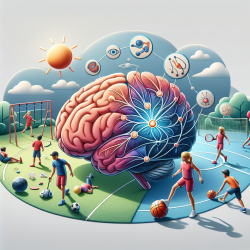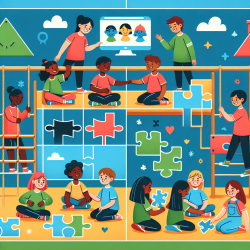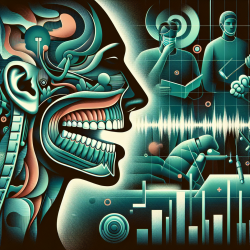Introduction
Sport-related concussions (SRC) are a significant concern in high school athletics, affecting cognitive abilities such as memory, processing speed, and impulse control. Recent research, "Changes in ImPACT Cognitive Subtest Networks Following Sport-Related Concussion," provides insights into how cognitive networks change post-concussion, which can guide practitioners in improving recovery outcomes.
Key Findings from the Research
The study utilized a large cohort of high school athletes to model cognitive recovery using network analysis. Key findings include:
- Increased Network Connectivity: Cognitive networks showed increased connectivity post-concussion, suggesting a compensatory mechanism where additional cognitive resources are recruited to meet task demands.
- Centrality of Processing Speed, Visual Memory, and Impulsivity: These cognitive domains were central to the network, indicating their significant role in cognitive recovery. Processing speed deficits, for instance, can impact performance across various tasks.
- Network Reorganization: Over time, the structure of cognitive networks reorganized, reflecting changes in how cognitive abilities interact post-injury.
Implications for Practitioners
Understanding these network changes can enhance concussion management strategies. Practitioners can focus on:
- Targeted Interventions: By prioritizing interventions that address processing speed, visual memory, and impulse control, practitioners can potentially improve overall cognitive recovery.
- Monitoring Cognitive Networks: Utilizing network analysis can provide a more nuanced understanding of cognitive recovery, beyond traditional composite scores.
- Developing Compensatory Strategies: Implementing strategies such as memory aids and mindfulness-based interventions can support recovery in these critical cognitive domains.
Encouraging Further Research
While this study provides valuable insights, further research is needed to explore:
- Diverse Populations: Including athletes with varying backgrounds and conditions to understand how these factors influence cognitive networks.
- Longitudinal Studies: Examining long-term changes in cognitive networks post-concussion to better understand recovery trajectories.
- Controlled Settings: Replicating findings in controlled environments to minimize variability in diagnostic criteria and test administration.
Conclusion
This research highlights the potential of network analysis in understanding cognitive recovery post-SRC. By focusing on central cognitive domains and utilizing targeted interventions, practitioners can enhance recovery outcomes for young athletes.
To read the original research paper, please follow this link: Changes in ImPACT Cognitive Subtest Networks Following Sport-Related Concussion.










